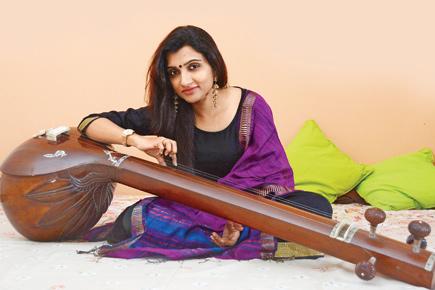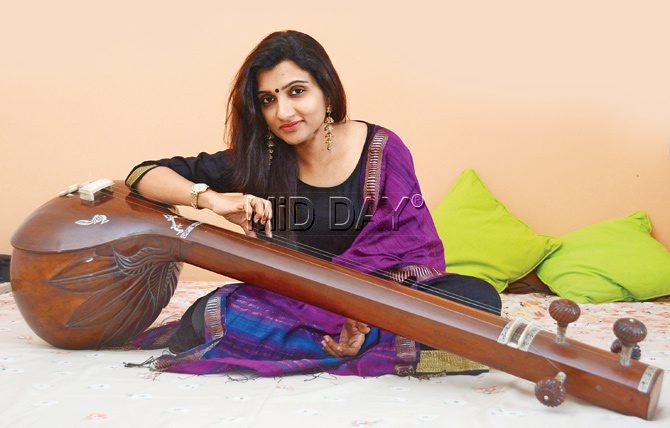Singer Manjari talks of why she picks the melancholic genre over others when she promotes music and musicians on her radio show

Singer Manjari
ADVERTISEMENT
One look at Manjari’s 11th floor Goregaon apartment and you know she is a singer. The hall looks like a ghazal baithak with an elegant teakwood sitar standing in one corner and a low seating arrangement dotted with colourful cushions. "I normally do my riyaz here," says the singer, readying to catch a flight to Dubai for a concert.

Pic/ Satej Shinde
Manjari, who prefers to be identified by her first name, is the youngest singer and the only Indian this year to win the prestigious Sahir and Adeeb International Award for Contribution to Urdu Literature and Promoting Ghazals. Established in 1978, the Ludhiana-based Sahir Academy and Adeeb International is an organisation committed to promoting literature, art and culture. Stalwarts like Gulzar, Javed Akhtar, BR Chopra and Begum Bushra Rehman are some of the artistes to have won the award in the past. Three others — two from Pakistan, one from USA — also received the honour this year.
As we sit on the baithak and chat, we see Manjari shifting easily from Urdu to Malyalam to English and then Hindi in the conversation. "I was born in Thiruvanthpuram but my family moved to Muscat. I went to a school there run by a Gujarati institution. So, I learnt a bit of Gujarati and also picked up Arabic, which was taught at school," she says. Her flair for languages extends to Tamil and Telugu considering she’s tried her hand at playback singing in the South since she was 17.
In fact, it was Ilaiyaraaja who gave her her first break in Sathyan Anthikad’s movie, Achuvinte Amma. She sang a duet, Swasathin Thalam, with Dr K.J Yesudas and a solo number, Tamarakuruvikku. "It was Yesudas who advised my parents to train me in classical music after he heard me perform at a concert in Muscat," she reminisces.
All of 29, Manjari’s entry into music began at the age of five. "I come from a family of doctors, but my mother was keen that I learn music. In fact, she wanted to enroll me for a class at 2. The request was turned down because I was too young," she laughs. Her first stage performance was with Shiva, the Kolkota-based rock band, when she was in Class 8.
Manjari might have just signed her first project in Bollywood (she refuses to reveal details), but she is a household name in the South, thanks to an immensely popular ghazal show, Khayal. "When you say Khayal, the ‘kh’ has to come from the epiglottis [a flap of cartilage behind the root of the tongue]. It is a guttural sound," she says, making us aware of our flawed pronunciation. On air since 2012, the show features musicians from across India. It also explores the ghazals of veteran Ghalib to Faiz Ahmed Faiz "When I would sing ghazals concerts in the South, I realised the songs and singing would be appreciated but the essence of the alfaz (lyrics) was always lost," she says. Since then Manjari has made it a norm to break the ghazal down for the audience. "You truly appreciate a ghazal only when you understand the intensity and nuances of poetry."
Her inspiration, however, is Mughal poet, Daag Dehlvi, well-known for his romantic poems and ghazals laced with Persian.
"His and Ghalib’s ghazals were about love. They were about the pain and longing that come from unrequited love. It touches your heart, even if you haven’t experienced heartbreak in real life," she says.
She says she was drawn to the genre while learning Hindustani classical music from Ustad Khalid Anvar Jan, a famed musician from Lahore. "Thanks to him, I met passionate poets, mainly from Pakistan. Our discussions would revolve around Faiz and Ahmed Faraz. In fact, they still do," says Manjari, who feels she still doesn’t have the skill to pen poetry of her own. "I compose music but I haven’t yet explored the writing bit."
Ghazals, she feels, are moving from niche genre into the mainstream with people requesting for them even at weddings. "I don’t normally perform at weddings, but a lot of youngsters are opting for ghazals at such functions. It has a melancholic undertone, and is not usual shaadi fare, but they are okay with it, because they are able to connect with it."
 Subscribe today by clicking the link and stay updated with the latest news!" Click here!
Subscribe today by clicking the link and stay updated with the latest news!" Click here!







